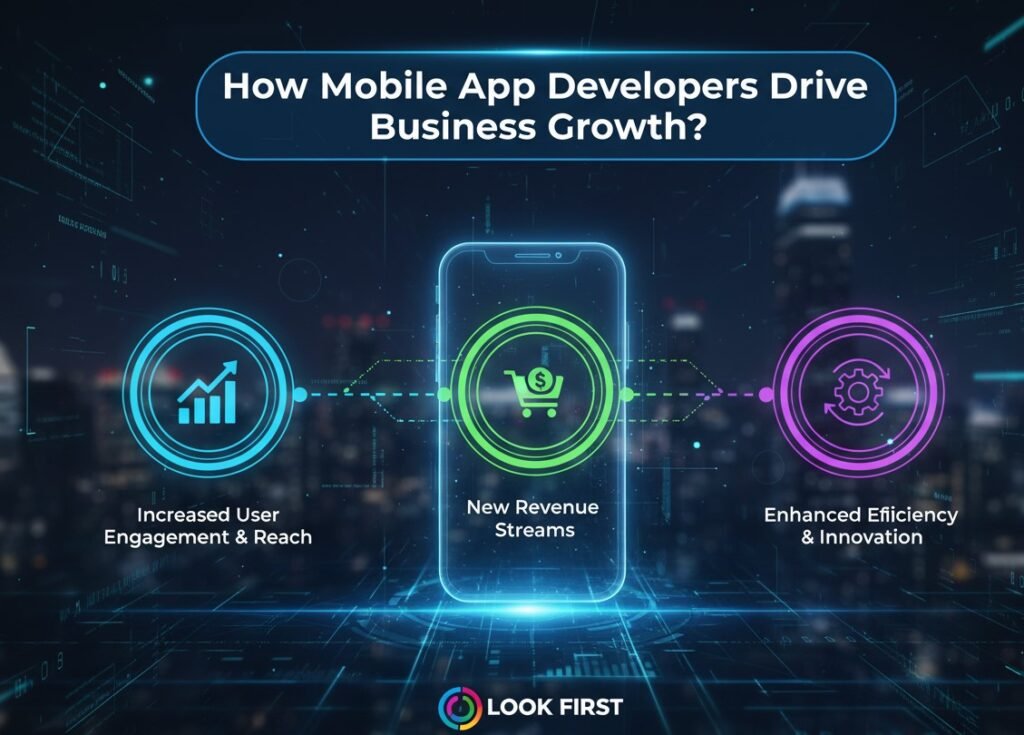In 2025, mobile technology continues to reshape industries and redefine customer expectations. Businesses in the UK and worldwide are moving beyond websites and adapting specialized mobile apps to sustain growth and engage audiences. For brands in London, where innovation drives competition, hiring professional mobile app developers has become more than just a trend; it’s a strategic investment in the future.
This article explores how expert developers contribute to business growth, what makes mobile app development essential in 2025, and why partnering with a reputable mobile development company can be your key competitive advantage.

The Role of Professional Mobile App Developers
Mobile app developers are the driving force behind modern business digitalization. Their role goes beyond coding; they integrate strategy, design, and user engagement to create mobile solutions that convert.
They help businesses by:
- Creating Customised Applications: Tailored apps reflect your brand voice, improve user experience, and enhance brand loyalty.
- Ensuring Scalability: Professionals design with future scalability in mind, ensuring that as your business expands, your app evolves efficiently.
- Enhancing User Experience (UX): Expert developers leverage the latest frameworks and UI/UX design trends to build intuitive, user-friendly interfaces.
Improving Brand Image: A high-performing app establishes credibility and positions your brand as innovative, especially in competitive markets like London.
Why is 2025 the Year of Business Digital Growth?
As consumer behaviour shifts to mobile-first interactions, 2025 is shaping up to be a defining year for mobile-led growth. Smartphones now account for more than two-thirds of digital interactions, meaning customers are more likely to engage through mobile apps than websites.
Developing a mobile presence is no longer optional; it’s essential for visibility, retention, and conversion. This makes mobile app development one of the most powerful tools to sustain digital relevance.
Key industry trends include:
- AI-Powered Personalization: Users expect apps that predict preferences and offer tailored experiences.
- Cross-Platform Development: Businesses now seek apps that seamlessly function on Android, iOS, and the web.
- Enhanced Security: With advanced encryption and compliance standards, data protection is a business priority.
Integration with IoT and AR: Intelligent features like AR-shopping or IoT-based data analytics expand the user experience.
How Mobile App Developers Drive Business Growth?

1. Enhancing Customer Engagement
A well-designed app provides direct communication between your business and the customer. With push notifications, live chat features, and personalized content, you can maintain real-time connections. This engagement improves customer satisfaction and retention.
2. Boosting Sales and Revenue
Mobile apps enable convenient purchasing and automatic upsells. Businesses across retail, healthcare, and finance benefit from an optimized mobile presence that shortens the sales funnel. For example, integrating smooth payment options and rewards programs encourages repeat sales.
3. Building Brand Recognition
A custom mobile app creates consistent brand presence in users’ everyday digital routines. Every time a user interacts with your app icon, it reinforces brand recall. Over time, this develops loyalty that traditional marketing struggles to achieve.
4. Collecting Insightful Analytics
Professional developers integrate tracking tools like Firebase and Mixpanel to monitor user activity. Analytics help identify customer preferences, optimize features, and refine marketing strategies, leading to higher engagement and conversions.
5. Streamlining Business Operations
Apps are not just for customers—internal enterprise apps improve team communication, project tracking, and workflow automation. This boosts productivity and reduces operational costs.
Choosing the Right Mobile Development Company in 2025
A professional mobile development company offers technical depth, creativity, and a results-driven approach. When selecting your partner, consider:
- Portfolio and Experience: Evaluate case studies and project outcomes across industries.
- Technical Expertise: Ensure the team is skilled in Flutter, Kotlin, Swift, React Native, and backend frameworks like Node.js.
- Cross-Platform Capabilities: Modern businesses need apps that perform across all platforms.
- Post-Launch Support: Reliable maintenance and updates are vital for long-term success.
- Transparent Communication: The best companies maintain consistent updates and agile project management
The Competitive Edge of Mobile App Development in London

The UK’s digital economy is globally recognized, and London is at its center. Here’s how focusing on mobile app development provides a competitive edge:
- Local Market Understanding: Developers familiar with UK consumer habits build highly targeted apps.
- Regulatory Compliance: Apps adhering to UK and EU data privacy regulations (GDPR) build customer trust.
- Cultural Relevance: Incorporating local trends and languages enhances connectivity with users.
- Innovation Access: London’s tech community promotes collaborative innovation between developers, brands, and investors.
Key Benefits of Mobile App Development for UK Businesses
- Increased Brand Visibility: Apps keep your brand always accessible.
- Improved Customer Loyalty: Personalized user experiences create lasting relationships.
- Expanded Revenue Models: Subscriptions, in-app ads, and purchases diversify income streams.
- Automatic Marketing Tools: In-app push notifications work as cost-effective retention strategies.
- Stronger Data Insights: Understand user behavior through analytics to shape smarter decisions.
Common Industries Benefiting from App Development
- Retail and E-Commerce: Apps provide frictionless checkout experiences and personalized recommendations.
- Healthcare: Appointment scheduling, telehealth, and wellness tracking apps enhance patient care.
- Education: E-learning platforms and virtual classrooms promote accessibility.
- Finance and Fintech: Secure mobile wallets, investment management, and instant transfers are now standard.
Future Trends in Mobile App Development (2025 and Beyond)
With each year, new technologies redefine what’s possible. The leading trends shaping mobile app development in 2025 include:
- AI Chatbots and Voice Assistants: Reducing customer waiting time through natural interaction tools..
- 5G Integration: Supporting faster, high-resolution app performance.
- Super Apps: Combining multiple services (shopping, chatting, finance) into one seamless experience.
- Blockchain Technology: For transparent transactions and enhanced data privacy.
FAQs
Q1: What is the average cost of mobile app development in 2025?
The cost varies widely depending on complexity, platform, and developer expertise. On average, simple apps range from £10,000 to £25,000, while feature-rich enterprise apps may exceed £80,000.
Q2: How long does it take to develop a mobile app?
A basic app can take 2 to 4 months, while complex ones with advanced features (e.g., AI integrations or APIs) may require 6 to 12 months.
Q3: Do I need separate apps for iOS and Android?
Not necessarily. Cross-platform frameworks allow developers to build apps that function smoothly across multiple operating systems, reducing cost and time.
Q4: What after-launch services should a good mobile development company provide?
Top companies offer app maintenance, regular updates, bug fixes, analytics tracking, and cybersecurity enhancements.
Call to Action
Let expert mobile app developers turn your vision into a powerful tool that drives engagement, growth, and success. Contact us today to discuss your business app project and step confidently into the mobile-first future.
